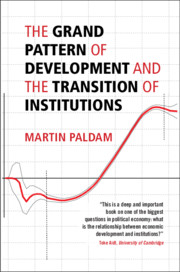Book contents
- The Grand Pattern of Development and the Transition of Institutions
- The Grand Pattern of Development and the Transition of Institutions
- Copyright page
- Contents
- Figures
- Tables
- Preface
- Part I Main Ideas
- Contents
- 1 Introduction
- 2 Some Technical Points
- 3 The Largest Historical Event
- Part II The Transitions of Institutions
- Part III The Grand Transition
- References
- Index
1 - Introduction
from Part I - Main Ideas
Published online by Cambridge University Press: 07 August 2021
- The Grand Pattern of Development and the Transition of Institutions
- The Grand Pattern of Development and the Transition of Institutions
- Copyright page
- Contents
- Figures
- Tables
- Preface
- Part I Main Ideas
- Contents
- 1 Introduction
- 2 Some Technical Points
- 3 The Largest Historical Event
- Part II The Transitions of Institutions
- Part III The Grand Transition
- References
- Index
Summary
A transition is the change from the traditional to the modern steady state. This book claims that all socioeconomic data have transitions. They are strong but fuzzy. The Equivalence Hypothesis claims that long time-series and wide cross-country samples tell the same transition story. For each variable it should be tested, but it is taken as default if the data cover only one of the two dimensions. Two-sector growth models can explain the typical transition curve. The transition in the OPEC-countries is different. Institutions are of two types: one includes building and staff, and the second is traditions and beliefs. The seven institutional indices analyzed are of both types. All are strongly correlated to income. The concepts of modest causality and practical exogeneity are introduced. The empirical strategy stresses replicability and robustness.
Keywords
- Type
- Chapter
- Information
- Publisher: Cambridge University PressPrint publication year: 2021

